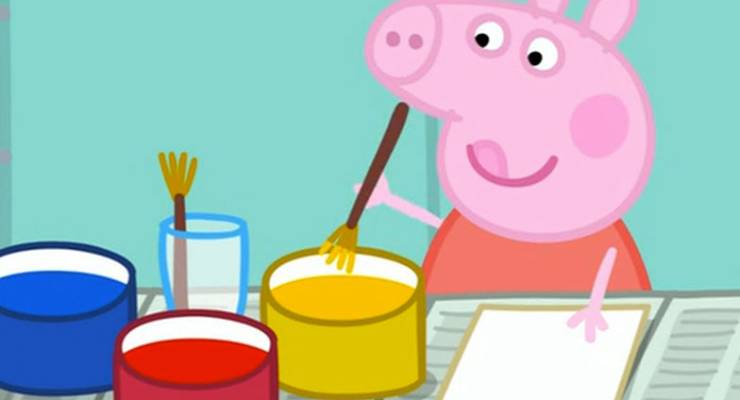
Why is Peppa Pig such a political football? This little piggy “pushes a weird feminist line”, wrote Piers Akerman in 2013. This little piggy was nearly shaved ham in 2014’s ABC budget cuts. (“Contrary to media rumours, Peppa’s is one snout we are happy to have in the ABC trough,” tweeted Malcolm Turnbull in response.)
And this month, this little piggy was “a corrupting influence for Muslim children, say leaders”, according to a news story in The Australian. This certainly was news to Sheikh Shady Alsuleiman, head of the Australian National Imams Council, who posted on Facebook that he’d never even heard of the stupendously popular British children’s animated TV series, which screens on ABC Kids. In this, the sheikh joins Barnaby Joyce, who once jocularly told journalists, “Last time I had Peppa Pig it was number 23 at my local Thai restaurant.”
Well, it’s regularly No. 1 in the ratings. As well as being ABC iView’s most-streamed show, Peppa Pig’s daily digital viewership regularly trounces those of programs on the main commercial channels, such as Sunrise and Today. Kids, it seems, are still avid fans of “appointment TV”.
Peppa Pig’s staggering global popularity arises from the show’s near-hypnotic effect on preschoolers, which grants a precious interlude of peace to their harassed parents. Created in 2004 as a series of 52 five-minute episodes, it follows a five-year-old piglet who likes splashing in puddles and lives at the top of a hill with her Mummy Pig, Daddy Pig and little brother George. To her infant viewers, Peppa’s mundane adventures with her squad of mammalian pals are absolutely riveting.
Today, the four-time BAFTA-winning series is screened in 180 countries and has spawned a billion-dollar empire of branded merchandise including books, DVDs, clothing, video games, crockery, stage shows and even Peppa Pig World, a Hampshire theme park. In March 2017, Peppa will invade Australian cinemas for an hour-long interactive spectacle, somewhat awkwardly titled Peppa Pig My First Cinema Experience: Peppa’s Australian Holiday.
The vast commercial scope of the Peppa Pig franchise reminds me of the near-future conclusion of Jennifer Egan’s 2010 novel A Visit from the Goon Squad, in which the entire music industry has been reconfigured around the tastes of “pointers”: toddlers who use handsets to buy digital files. And the media disquiet over Peppa’s political and moral influence is often framed around its young viewers’ intimate access via mobile screen technology.
In July this year, News Corp ran a story on “Why experts say Peppa Pig is a danger for kids”. The one expert who said anything of the sort is prolific media commentator Dr Karen Phillip, who argued that, thanks to early immersion in screen-based entertainment, “kids are losing the capability of developing skills in empathy and reading other people’s body language because they’re so not in tune with it anymore. … Even four and five year olds are losing the ability to come up with new games, new concepts and new ideas because they’re so used to being entertained by an external source.”
The scientific research on this is rather more nuanced. And why single out Peppa Pig to blame? Perhaps its blanket popularity makes the series emblematic of children’s entertainment more broadly. This same “mainstream-ness” also allows the tabloid media to harness Peppa to its favourite dog-whistle topics.
The recent Oz story craftily conflated several different sets of comments to create the misleading impression that Muslims are united against the show. Such articles are intended to entrench “us versus them” social divisions — and distort public perceptions of Muslim populations — by sparking angry, knee-jerk responses. You know, like Immigration Minister Peter Dutton’s recent call to “rise up” and defend Christmas, which is under attack from nobody.
What actually happened, in this instance, is that Sydney production company One4Kids is currently crowdfunding an Islamic-themed animated children’s show called Barakah Hills, which One4Kids is promoting as “our Peppa Pig alternative”. Given that only 2.4% of Australians are Muslim, Barakah Hills is clearly a niche program that isn’t seriously competing with Peppa Pig, much less gunning to replace it.
But once again, it’s politically convenient to depict culture as a zero-sum game in which multiple voices represent threats. This leaves One4Kids producer Subhi Alshaik in the absurd position of having to reassure a national newspaper that Islam has no beef with pigs: “I’ve patted pigs, I’ve watched Babe, we just don’t eat them.”
Children have always been seen as emblems of society’s future, which is why moral panics about the pace of social change often fixate on kids’ entertainment. As Annabel Crabb pointed out in 2013, such claims have included the alleged homosexuality of Tinky Winky from Teletubbies and the subliminal pro-drug messages of groovy ’70s shows such as The Magic Roundabout and Scooby-Doo. Andrew Bolt even took a swing at Finding Nemo in 2003.
It’s ironic that right-wing commentators are constantly slamming the academic disciplines of media and cultural studies, yet their own claims about the nefarious contents of children’s entertainment depend on mercilessly close media readings and the tendentious decoding of cultural symbols. But there really isn’t much for pearl-before-swine-clutching detractors to unpack in Peppa Pig.
The most commonly cited anxiety over the show’s actual content is that cheeky Peppa is “making toddlers naughty” as they model her “rude” behaviour. One egregiously fictitious (but nonetheless widely shared on “crunchy mom” websites) article even claimed Peppa Pig causes autism.
But comedian Lee Gilmour’s filthy-mouthed “Scottish Peppa Pig” redub only underscores how mild the original is. Indeed, Peppa Pig co-creator Phil Davies told the Irish Independent in 2014: “The language is clean. That takes a lot of effort.” You can imagine the Daily Mail’s glee in 2015 when it uncovered a malfunctioning Peppa Pig “Find and Learn” tablet device that appeared to say, “Fuck you”.
“So why have I been blinkered enough to allow this family to infiltrate my home and influence my children’s malleable young minds?” wrote fretful mother Naomi Greenaway in the Daily Mail in 2015. “I confess it might have something to do with the fact that I find it pretty watchable.”
And that’s it, really. Parents of small children are perhaps less interested in fighting cultural wars than the media, which seem disproportionately obsessed with Peppa Pig as an ideological Trojan horse. Sure, everything is political. But importantly, Peppa Pig is also tolerable. Especially in the repeated viewings on which obsessive toddlers insist.








Peppa Pig is awesome. The grandchild (2 years 8 months) quotes whole slabs and has very pleasing pronunciation and ultra clear enunciation as a result. The characters are enthusiastic about outdoor activities and this rubs off as well.
Sensitive, attuned, tolerant behaviour is much in evidence, but some scepticism is afforded to those adults who pompously assert their authority. Can’t imagine why the right object, can you?
I think this country is descending into a realm of utter stupidity that defies any logic. Keith1 is spot on. Just watched an episode about sowing seeds and using a scarecrow to keep birds away. Charming, meaningful and well worth watching.
ABC Kids – no ads, no screechy purveyors of junk food and useless toys, no grooming of impressionable minds… It is no wonder the commercials and their unctuous and sycophant like “experts” have Peppa Pig in their sights.
Lola in Charlie and Lola is more likely to make toddlers naughty.
There IS the small matter of Daddy Pig being mercilessly fat-shamed…
Wonderful family orientated entertainment . My daughter used to love it. PP is mildly naughty if kids think about her initials.